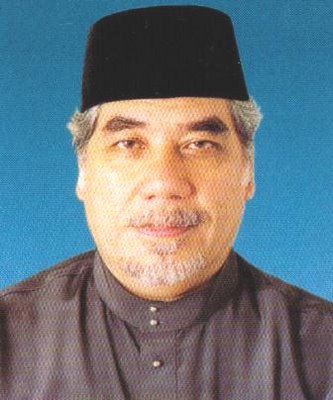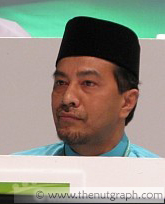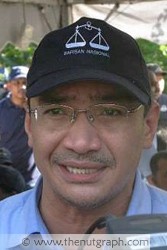I was glad to read a GOoD article today, so here's sharing -- anything that draws us away from the madness is good for the soul, fellow Malaysians, so EJOY!:)
Manipulating the news: A public disservice

NEWSPAPER coverage of the 13th general election contains the usual barrage of Barisan Nasional (BN) news and Pakatan Rakyat (PR) bashing. It makes one wonder how, with so many other sources of news now, some traditional media think it can get away with distorting and manipulating the news.
The same event or speech gets reported in multiple media. Ceramah recordings are freely available on YouTube. And because this is the case, it is now easier to spot when information has been left out of some news articles to slant it a certain way.
As case studies, PAS’s stand on hudud and a ceramah by PAS vice-president Datuk Husam Musa are two examples of topics in the elections that have been manipulated by the traditional media. Such distortions harm public discourse and deeper understanding of issues, which are so crucial to us in a multi-ethnic, multi-religious society.
PAS and Hudud
The English newspapers, particularly The Star, have been going to town with the hudud issue, front-paging a statement by Johor DAP deputy chair Norman Fernandez warning Malaysians of PAS’s hudud agenda.

Mustafa Ali (Wiki commons)
On 27 April, The Star and New Straits Times carried reports on a press conference given by PAS secretary-general Datuk Mustafa Ali to explain PAS’s stand. Both headlines stressed PAS’s commitment to hudud. PAS won’t waver from its Islamic agenda, was The Star’sheadline. PAS committed to hudud despite DAP not agreeable (sic), said the New Straits Times.
The New Straits Times relied on a Bernama report that was relatively brief. “(Mustafa) said hudud was PAS’s agenda and that the party would champion it,” it said.
The Star quoted Mustafa as saying: “No Muslim will dare reject hudud. These matters are PAS policies and we will not abandon them”, and “Hudud is a PAS agenda, not Pakatan’s. PAS will do it through discussions because the implementation of hudud is not automatic if Pakatan wins the elections”.
But a Malaysian Insider report gives a slightly different story. “If PAS wants to [implement hudud], we do it through the democratic process … not automatically” was Mustafa’s quote. The article’s opening also stressed that Islamic criminal law would only be implemented through democratic means.
Somehow, “democratic process” became “discussions”, and the democratic aspect of Mustafa’s statement was completely absent from the traditional media’s reports.
That Mustafa spoke about going through the democratic process is also significant as PAS would require a majority in Parliament to pass Islamic laws. As our Federal Constitution is secular, PAS will need a two-thirds majority to amend the constitution if it wishes to implement Islamic laws federally. As it is only contesting 73 out of 222 seats this election, this will not yet be a reality even if the Pakatan Rakyat takes over federal power.
Death and corruption

Husam Musa
Another instance of missing information were the reports in theNews Straits Times and The Star on Home Minister Datuk Seri Hishammuddin Hussein’s criticism of PAS vice-president Husam. Hishammuddin took Husam to task for remarks made in a 27 April 2013 ceramah in Putrajaya, where Husam is standing for Parliament. Husam had referred to the assassination of Customs Department deputy director-general Datuk Shaharuddin Ibrahim.
Both the New Straits Times and The Star reported Hishammuddin saying this: “He (Husam) is being irresponsible for linking the death of the Customs officer with corruption.”
The Star quoted Hishammuddin’s words that Husam was “rude and offensive” towards the victim’s family. And according to the New Straits Times, Hishammuddin also said that Husam’s words could offend civil servants throughout the country.
Without further background information, it would appear that Husam had somehow accused Shaharuddin of corruption, leading to his shooting in Putrajaya on 26 April 2013. This would indeed be an offensive speculation if made without proper evidence. But a Malaysiakini report of the ceramah states that Husam actually speculated that the murder may have been due to Shaharuddin’s tough stance on drug smuggling, with reports of Shaharuddin being called “Mr Clean”.
Malaysiakini also reported Husam’s comment that, if the police failed to catch those responsible, the murder would only prove prove the reality of people’s fears that crime is escalating. Husam’s remarks on Shaharuddin were actually in the context of the need to reduce crime.
The Star and New Straits Times, by omitting information on what Husam really said at his ceramah and by reporting Hishammuddin’s remarks without verifying if the home minister himself was accurate, have given readers a slanted picture that vilifies the opposition candidate.
Lies and distortion

Hishammuddin
It’s one thing for a paper to give extensive coverage to its political masters or to the party that owns it. But it’s another thing altogether to distort a news story to paint a completely different picture. Granted, the report on Hishammuddin’s remarks may have been due to Hishammuddin giving a distorted picture in the first place. But, as the report on what Husam’s said was freely available online, it would have been responsible use it as proper background to the home minister’s reaction.
As for the PAS and hudud issue, rather than scaremongering and trying to instil fear in non-Muslims voters, more pertinent questions could have been raised. What is hudud? What is its purpose? How do the punishments of amputation and stoning correspond with modern-day realities and human rights? Are there discussions among Islamic scholars on whether or not such punishments should be implemented today? Is PAS engaging with such Islamic scholars on these issues, and what version of hudud law are they advocating? Are the DAP and PKR engaged in dialogue with PAS on these issues, and what is the outcome of such dialogue?
The fact is, we live in a society where some people want hudud law implemented and some do not. It is unhelpful for the press to merely keep pointing that out without offering any solutions. The role of the media is to serve the public interest. And public interest would be served better if the media helped to unpack the issues and hold our leaders accountable for the claims they make, rather than to politicise their statements. Where the media is supposed to promote discussion, it is instead stifling all hope of genuine public discourse and greater understanding all round.
If there is any hope for our traditional media to regain its public-interest role and stop being political mouthpieces, there needs to be a drastic change to our printing laws and ownership structures. It is therefore crucial to pressure the next government, whichever coalition comes to power, to make these changes a reality so that, hopefully, come next election, we will be spared from the manipulated facts that we’ve been served in the traditional media for so long now. 
Ding Jo-Ann is part of the Centre for Independent Journalism (CIJ)’s media monitoring team for GE13. She was previously CIJ’s media monitor and has monitored media coverage of both Bersih 2.0 and Bersih 3.0. She is also the co-author of CIJ’s Freedom of Expression 2011 report.


3 comments:
TERKINI!! SAH, ANWAR BERSUMPAH DEPAN KAABAH!!! http://www.youtube.com/watch?v=nKZIPJ0PMTw
TERKINI!! SAH, ANWAR BERSUMPAH DEPAN KAABAH!!! http://www.youtube.com/watch?v=nKZIPJ0PMTw
Post a Comment